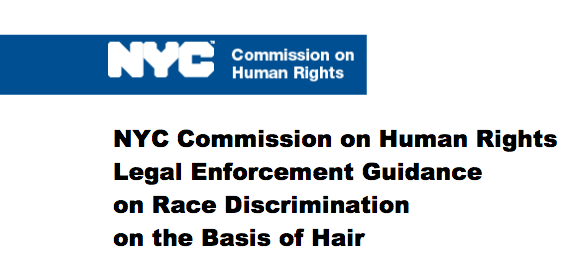- Free Consultation: (631) 352-0050 Tap Here to Call Us
New York City Hair Discrimination

In February 2019, the New York City Commission of Human Rights issued enforcement guidance concerning race discrimination based on hair. Today’s Long Island employment law blog discusses this new guidance.
Federal law, New York State law, and New York City law have all made race discrimination unlawful and have done so for many years. But, New York City has tried to set itself apart from other laws and other jurisdictions by ensuring its laws are liberally construed and that they provide the most protection possible to employees and the public. Indeed, the New York City Human Rights Law directs courts and administrative agencies to interpret the law separately and distinctly from any other similar laws.
In its latest attempt to distinguish itself as leading the way in anti-discrimination laws, the Commission issued guidance about hair discrimination. To begin with, the guidance makes clear that discrimination based on racial stereotypes is illegal. Moreover, the guidance makes clear that hair discrimination can relate to other types of discrimination such as sex, gender, religion, disability, or national origin. But, the Commission sought to “affirm” that acts which would tend to ban or otherwise inhibit hairstyles associated with Black people is illegal.
The Commission detailed the types of hair typically associated with Black people. The Commission noted that such hairstyles can be either the result of natural hair growth or the result of manipulation. Either way, hairstyles represent a highly personal decision made after consideration of any number of factors including, medical, spiritual, or other personal reasons.
Further, the Commission determined that there is a “fundamental racist belief” that hairstyles worn by Black people are not suited for “formal settings” and that Black people have faced discrimination from hair policies.
The Commissioner declared that “Black hairstyles” are protected as racial characteristics by the New York City Human Rights. This means that the employers cannot discriminate against employees or applicants because of hairstyles associated with Black people. Moreover, employers cannot adopt grooming policies which would discriminate against Black employees. Further, employers cannot enact policies would require Black employees to “manipulate hair to conform to employer expectations.” The Commission would interpret such policies as direct evidence of retaliation.
Additionally, the Commission noted that facially neutral policies may also adversely impact Black employees. A facially neutral policy is one which does not expressly prohibit a Black hairstyle, but the effect of the policy is that it impacts Black people more than others.
Employers may, however, adopt policies for legitimate concerns about health or safety. Employers must first consider other ways to meet its concern before adopting a policy which restricts employees’ hairstyles. That may include using hairnets or other coverings.
In addition to employment, the Commission’s new guidelines also cover places of public accommodation. This covers most businesses in New York City, including private and public schools.
If you have questions about a workplace hair policy or about the New York City Commission of Human Rights new hair discrimination enforcement guidance, contact a Long Island employment lawyer at Famighetti & Weinick PLLC at 631-352-0050. More information about race discrimination is available on our website at http://linycemploymentlaw.com.
NYC Hair Discrimination Guidance









